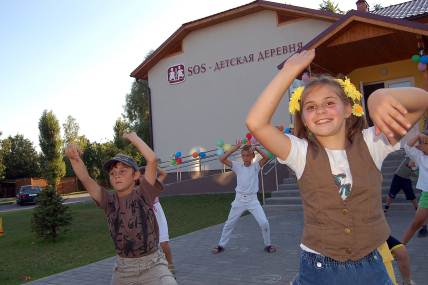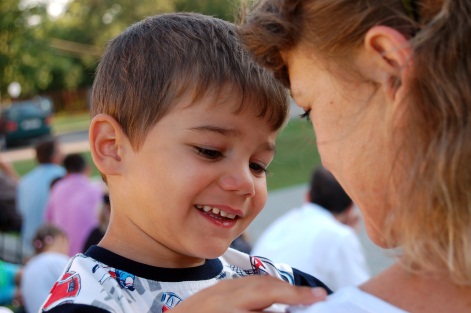The hardship of living in a transition economy

Dancing in the garden (photo: M. Mägi)
Mogilev is a city in eastern Belarus close to the Russian border. Mogilev is the third largest city in the country and one of the main economic centres. The main activities include engineering, machine building and metal works. The production of rubber products and the chemical and petrochemical industries are also important. The rural area around the city is dedicated to agriculture, as well as dairy and cattle farming.
The city of Mogilev is about 500 km from Chernobyl and unfortunately the region was one of the worst affected by the nuclear disaster as it got the full impact of the radiation cloud. The medical facilities are struggling to meet the needs for treatment and care for the population who continues to suffer as a result of the accident. The catastrophe has had long-lasting effects on the local population: many people in the region moved out of the areas with the highest rates of contamination, and have had to find a home and a new way of making a living in an unfamiliar environment.
The Belarusian economy suffered after the collapse of the Soviet Union in 1991, and although it has shown some improvement, the area around Mogilev has one of the highest levels of poverty in the country. The recent social and economic changes, which have included significant rises in the price of food and other basic goods, have resulted in more children living in vulnerable conditions. There is an increasing number of children who are not able to live with their families, and at present most of these are placed in institutions.
Domestic violence continues to be a problem for many women and children in Belarus. According to a United Nations survey, about one in four women are subject to physical abuse. Many more are believed to be suffering from emotional abuse. Although the government has started to take some action, domestic violence is still a taboo subject and women are reluctant to speak out or seek help even when it is available.
Providing support for families in need and loving homes for children
Although the state has taken some measures to help children who have lost parental care, our work in the area remains as crucial today as it was when we started working here. SOS Children's Villages has been very active in influencing the social care standards at both the national and local level. In addition, providing assistance to vulnerable families and giving a loving home to children who cannot live with their families have formed the core of our organisation's work in the area. Our long-term help for women with no social support and those wanting to escape from domestic violence is one of the first programmes of this kind in the whole country.
What we do in Mogilev

A magical hug and smile (photo: M. Mägi)
Strengthen families: A central part of the work that SOS Children's Villages carries out in Mogilev is related to supporting children and families in the community. This work is particularly important in an area where families face many economic and social difficulties.
Working with local authorities and other service providers, we offer a comprehensive package of services to enable families to stay together and take good care of their children. We give families material aid such as food and clothing, as well as educational support and access to health care. In order for parents to generate income, we offer them vocational training, career counselling and advice on how to look for a job.
We also provide material and psychological support to mothers who have nobody to turn to for help and to victims of domestic violence. Each woman is given the help that she needs to get her life and that of her child or children back on the right track.
Care in SOS families: Children whose families can no longer take care of them can find a loving home with an SOS mother in one of the SOS families which can look after up to 71 children. Some of these families are foster families who are supported by SOS Children’s Villages. SOS parents have been professionally trained to create emotionally stable relationships in a nurturing and secure home. The children from the SOS families attend nearby schools or kindergartens together with local children, which helps them become part of the community.